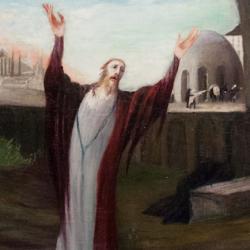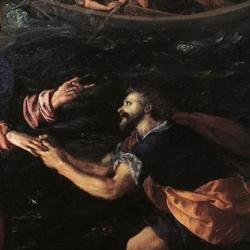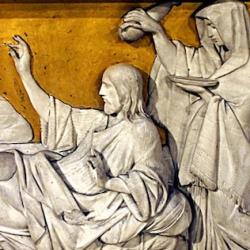INTRODUCTION
Who was tried by Pontius Pilate, tortured, and crucified? All the heretics denied it, but Christian orthodoxy has always said that, impossible as it seems, the One who suffered on the cross was none other than God the Son in human flesh.
THE TEXT
“When morning came, all the chief priests and elders of the people plotted against Jesus to put Him to death. And when they had bound Him, they led Him away and delivered Him to Pontius Pilate the governor . . . .” (Matthew 27:1-10).
MORNING
The passion of Jesus moves from darkness to light. Jesus celebrated Passover with His disciples in the evening (26:20), and during the night He was arrested and tried before the Sanhedrin, while Peter denied Him outside in the high priest’s courtyard. Now day dawns (27:1), but this day turns to darkness (27:45). Only after a second evening and morning (27:57; 28:1) do we enter into day. Jesus has come to bind the strong man (12:29), but instead he, like John before Him (14:3), is bound as the Jews hand Him over to the Romans.
INNOCENT BLOOD
Blood is a key theme of this section (vv. 4, 6, 8). Everyone in the story tries to escape the condemnation of shedding Jesus’ blood, but Jesus’ blood will be charged to Jerusalem, the city of blood (23:34-35). When Judas recognizes that his betrayal has led to Jesus’ condemnation, he acknowledges that he is under a curse (cf. Deuteronomy 27:25). Judas knows that the temple authorities conspired with him, and he throws the blood money where it belongs – into the temple (v. 5). For their part, the chief priests deny any involvement in the matter, but they admit their guilty when they hastily remove the blood/money before it can defile (v. 6). They even concede that they cannot remove the curse from Judas (Matthew 27:4). “See to that yourself,” and Judas does, taking his own life in a desperate attempt to pay for Jesus’ blood with his own (cf. Number 35:33; Leviticus 24:21). The Jews try to escape the blood guilt, but they cannot escape it any better than Judas can, and they eventually spread the guilt out on the whole nation, and their children (27:24-25). Peter too betrayed Jesus; his betrayal was also predicted by Jesus; Peter too brought down curses with his self-maledictory oaths (Matthew 26:69-75). But Peter turned not to the priests but to Jesus, whose blood is poured out for forgiveness (26:28).
TO THE POTTER’S FIELD
Matthew claims to quote from Jeremiah, but actually quotes from Zechariah 11:12-13. Matthew knows what he’s doing. He quotes from Zechariah but evokes passages in Jeremiah too (Jeremiah 18-19; 32:6-15). Zechariah’s prophecy comes in the context of Yahweh’s threat that He will break the staves of “Favor” and “Union” (11:10, 14), and place a “worthless shepherd” over His people (11:17). Jeremiah warns that Israel will be shattered like a clay pot because they worship idols and shed innocent blood (19:4, 10-11). In the later passage, Jeremiah purchases a field and stores the deed in a pot, a sign that Yahweh will one day restore His people to their land. The Jews have become like the nations, plotting against the Messiah; so they will be shattered (Psalm 2).











